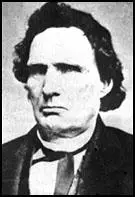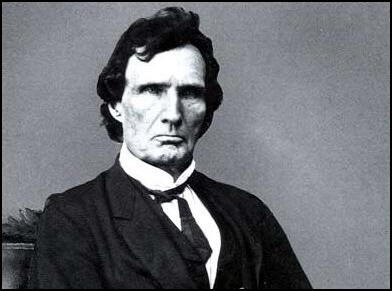Thaddeus Stevens

Thaddeus Stevens was born in Danville, Vermont, on 4th April, 1792. After graduating in 1814 he was admitted to the bar and practised in Pennsylvania. A strong opponent of slavery, he defended a large number of fugitives without a fee.
A member of the Whig Party, he was elected to the State Legislature (1833-41) and the House of Representatives (1849-53) where he played a leading role in the campaign against the Fugitive Slave Act passed in 1850.
After the demise of the Whig Party, Stevens joined the Republican Party and was elected to Congress in 1859. He fully supported Abraham Lincoln during the Civil War but after his death in 1865 he increasingly came into conflict with the new president, Andrew Johnson.
Stevens helped draft the Fourteenth Amendment to the Constitution and the Reconstruction Act in 1867. He argued in Congress that Southern plantations should be taken from their owners and divided among the former slaves. As leader of the Radical Republicans in Congress, Stevens proposed the resolution in 1868 for the impeachment of Andrew Johnson.

Stevens health declined during his dispute with Andrew Johnson and he began making preparations for his funeral. This included the request that he should be buried among African Americans in Lancaster, Pennsylvania.
Thaddeus Stevens died on 11th August, 1868. Inscribed on his tombstone were the words: "I repose in this quiet and secluded spot, not from any natural preference for solitude; but finding other cemeteries limited as to race, by charter rules, I have chosen this that I might illustrate in my death the principles which I advocated through a long life, equality of man before the Creator".
Slavery in the United States (£1.29)
Primary Sources
(1) Thaddeus Stevens, New York Herald (13th December, 1865)
Reformation must be effected; the foundation of their institutions - political, municipal, and social - must be broken up and relaid, or all our blood and treasure have been spent in vain. This can only be done by treating and holding them as a conquered people. Then all things which we can desire to do follow with logical and legitimate authority.
(2) Thaddeus Stevens, speech in Congress (3rd January, 1867)
Since the surrender of the armies of the confederate States of America a little has been done toward establishing this Government upon the true principles of liberty and justice; and but a little if we stop here. We have broken the material shackles of four million slaves. We have unchained them from the stake so as to allow them locomotion, provided they do not walk in paths which are trod by white men. We have allowed them the privilege of attending church, if they can do so without offending the sight of their former masters. We have imposed on them the privilege of fighting our battles, of dying in defense of freedom, and of bearing their equal portion of taxes; but where have we given them the privilege of ever participating in the formation of the laws for the government of their native land?
What is negro equality, about which so much is said by knaves and some of which is believed by men who are not fools? It means, as understood by honest Republicans, just this much, and no more: every man, no matter what his race or colour; every earthly being who has an immortal soul, has an equal right to justice, honesty, and fair play with every other man; and the law should secure him those rights. The same law which condemns or acquits an African should condemn or acquit a white man.
(3) Thaddeus Stevens, wrote his own epitaph that appeared on a tombstone in an African American cemetery.
I repose in this quiet and secluded spot, not from any natural preference for solitude; but finding other cemeteries limited as to race, by charter rules, I have chosen this that I might illustrate in my death the principles which I advocated through a long life, equality of man before the Creator.


